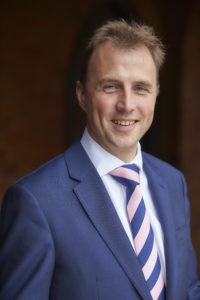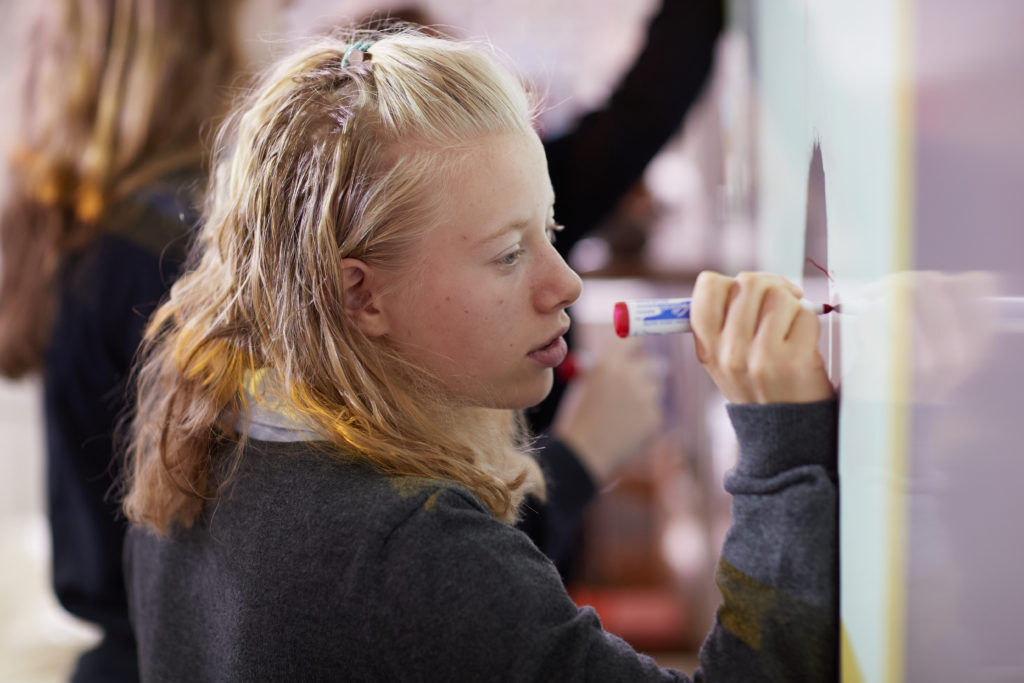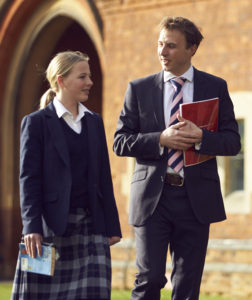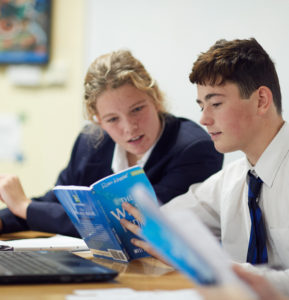Belief, Reflection and Growth: a St Edward’s education
 The academic ethos at St Edward’s is fuelled by a number of complementary principles and beliefs. We urge our pupils to look to long term life goals rather than just exam results; we encourage pupils to be reflective and to find their own solutions to challenges; and we value and promote a range of different learning techniques, actively helping our pupils to understand which work best for them. The Shell Curriculum introduces our youngest pupils to these concepts, and the new academic facilities being built in the Quad will enable us to embed them ever more firmly into school life. Sixth Former Octavia Hamilton talked to Deputy Head Academic, Matthew Albrighton, about these principles, how they shape our academic approach and how they impact our understanding of what it means to be successful.
The academic ethos at St Edward’s is fuelled by a number of complementary principles and beliefs. We urge our pupils to look to long term life goals rather than just exam results; we encourage pupils to be reflective and to find their own solutions to challenges; and we value and promote a range of different learning techniques, actively helping our pupils to understand which work best for them. The Shell Curriculum introduces our youngest pupils to these concepts, and the new academic facilities being built in the Quad will enable us to embed them ever more firmly into school life. Sixth Former Octavia Hamilton talked to Deputy Head Academic, Matthew Albrighton, about these principles, how they shape our academic approach and how they impact our understanding of what it means to be successful.
Can you tell us how the balance between passion and structure supports our academic ethos at Teddies?
There has been an interesting transition from the historical view of teaching as a series of inspirational ‘performances’ from the front of the classroom, to today’s focus on developing within pupils the skills to allow them to learn. I hope that at St Edward’s we get the balance right. The real danger of relying on an inspirational approach is that if the inspiration misfires, it can leave a large number of pupils behind. However, at the other extreme, there is a danger of being instrumentalist, too skills focused, where pupils switch off and are uninspired by the experience.
What are the academic standards for Teddies as an institution?
I would change standards to expectations and ambitions. What I think we do very well here and what I hope is beginning to be well understood is the notion that if you come to Teddies and you believe you can grow, you can achieve great things. Belief and effort will develop into confidence, so what we’re looking for are pupils in whom we believe we can instil the confidence to grow.
Honesty is an interesting expectation. Teachers are at their best when pupils are honest and straightforward. We don’t want to create a sense that if you make a mistake or fail, it’s a bad thing. The important thing is to be honest and to want to improve. Honesty leads to reflection which is a vital factor in moving forward. The most important of our academic expectations is a genuine willingness to engage, to be involved, to use feedback and to take a risk with learning and this will lead to better exam results.

You mentioned that you don’t want pupils to think of failure as a bad thing. How do you define failure? How should the pupils define failure?
Failure is not a permanent condition. If you try something and it hasn’t worked, don’t wallow in it, just try again. There’s a famous quote by Samuel Beckett: ‘Ever tried. Ever failed. No matter. Try again. Fail again. Fail better.’ This is a powerful mantra for Teddies. The worst thing is to allow yourself to keep making the same mistake over and over again. That’s not failure, that’s an act of futility.
How do you define success? How should the pupils define success?
This can be very difficult to unpick because ultimately society defines success by position: if you find yourself in a certain position you are seen to be successful. I really hope we don’t perpetuate this belief system at Teddies. If an individual chooses a certain path and wants to define success in a particular way, that’s fine, but we, as a school, hope to instil in our pupils an understanding of what it means to be a successful human being, and that’s a very different thing. At Teddies, we want success to be defined on a much broader level: as not only achieving in exams, but most importantly, growing as a person, learning from others and having compassion. We want to create successful adults, and that means developing the traits of empathy, compassion and kindness. Being a good businessman might make you a great deal of money – but is that enough? Success should be creating a richly textured life for yourself and those around you and that is what the culture at Teddies is all about – not just the good exam results, but enabling pupils to become mature and compassionate human beings. This might seem idealistic, but if education is not idealistic then what is the point?
How does Teddies differ in its academic goals and principles to other schools? Is there a specific atmosphere?
We are against making decisions about children at a young age based purely on raw academic results. We actively seek young people who have more to offer our community than simply being good at exams. Making decisions based solely on results can preclude a whole host of people with different talents, abilities and enthusiasms, and it’s this breadth that makes the Teddies community so alive and refreshing.
Is our academic culture distinct from the overall culture of Teddies?
I hope not. What I’ve tried to do, since I came to this school, is to make sure that we align the general ethos of development across all areas of school life: an ethos of collaboration, kindness and respect, in the classroom, in House, on the playing fields, in the Recital Room, on stage: everywhere, in fact. With that comes success – however we define it – and the ability to continue to grow. If you disconnect the academic ethos from school ethos, there’s a problem: they cannot be separate.
Which areas need more development?
The collaborative element still needs work. We have taken huge strides, but there is always room to improve. I’d like us to have a more universal approach to service which applies inside and outside the classroom. We can work on this collectively and structurally. The busy timetable can be a challenge and perhaps we can inadvertently imply a skewed set of priorities. Kindness and service are really important and, as I’ve said, fundamental to our view of what makes us good human beings – but of course these things are difficult to timetable. We need to think about how we build our values into our school systems.
How has the examination style changed? Is this reflected in the Teddies’ ethos?
The IB has a more varied set of assessment criteria than A Levels and that’s one of the reasons why it has become so popular. I think we, as a school, would favour assessment criteria which embrace greater variety to explore strengths in different ways. Traditional examination styles employ narrow assessment criteria, placing them somewhat at odds with the School’s principles and ideologies. It can be difficult to adhere to the School’s wholehearted belief in the importance of metacognition (learning about learning) if we have to stick to a really narrow path.
We are currently looking at how we can develop ourselves, here at Teddies, to enhance prescribed courses such as GCSEs to bring them into line with what we believe to be the right education for young people facing life as adults in these early years of the 21st century.
What are your top three values? Why do you think they’re important and how will you embed them in school life?
 Above all else: compassion. As the world moves towards automation and artificial intelligence, it is easy to lose sight of the fact that humans are at the centre of everything. We face the world better and enjoy life more if we have compassion. Further, if we define success as bringing out the best in the people around us, an emphasis on collaboration and respect for other people – taking the time to understand different points of view – is equally important.
Above all else: compassion. As the world moves towards automation and artificial intelligence, it is easy to lose sight of the fact that humans are at the centre of everything. We face the world better and enjoy life more if we have compassion. Further, if we define success as bringing out the best in the people around us, an emphasis on collaboration and respect for other people – taking the time to understand different points of view – is equally important.
We face a particular challenge in Western society as traditional models of leadership stem from the legacy of an autocratic, male-dominated culture. Things are changing rapidly: the autocratic style is becoming less successful. Increasingly, decisions are made collaboratively and with compassion.
What do you want the pupils to take away from Teddies?
The belief that they can continue to grow, but that they can’t do it without others; and others can’t do it without them. I hope pupils leave Teddies understanding that if they pursue their goals at the expense of others, it is not success in the way that we understand it.